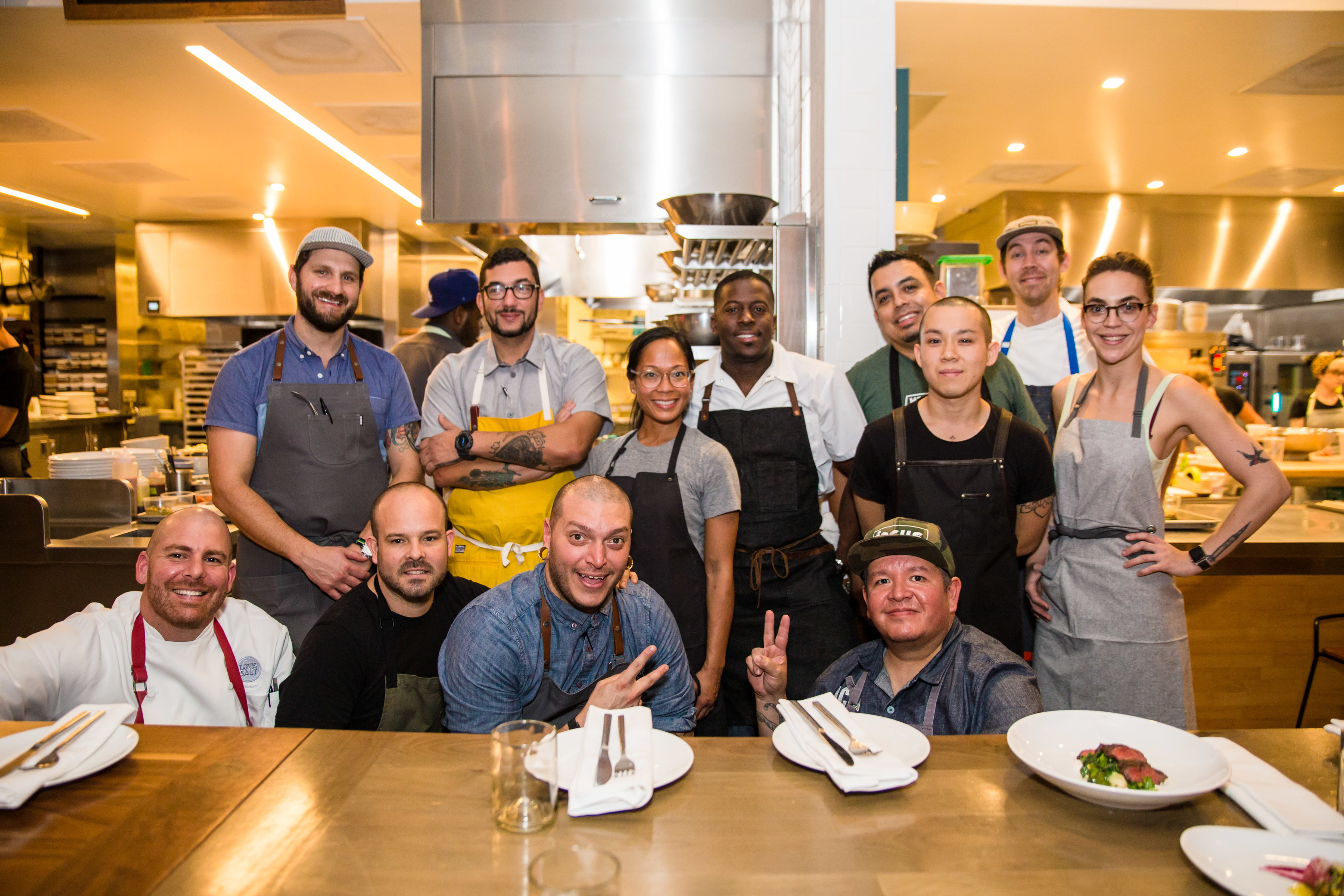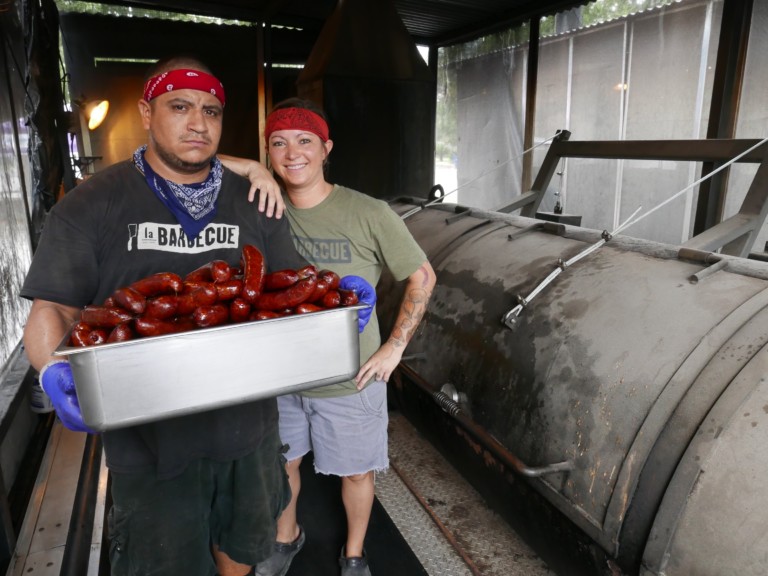Indie Chefs Week recently convened in Los Angeles, showcasing the collective talents of 21 leading American chefs during the course of three dinners. Chef Ned Elliott and restaurateur Grover Smith co-founded the event in 2013 as a way for chefs to meet, collaboration, and exchange ideas related to both food and business. Indie Chefs Week previously gathered chefs in Austin, Costa Mesa, and New York City, with Houston forthcoming, and united at The Rose-Café Restaurant in Venice from November 5-7. After experiencing the grand finale, I asked nine participating chefs, “What steps can the restaurant community take to guard against homogenization?” Read their thoughtful responses.
Jillian Bartolome (Aquî)
Progress, invention, and innovation happen because of education and experience. Professionals could do more to educate their employees and peers so that they may start on a higher platform than the previous generation and launch into newer and creative directions. They can also provide experiences that broaden perspectives and expose individuals to diverse ideas (like ICW).
Brett Cooper (Aster)
Homogenization is a big problem right now in our industry. The presence of social media and the immediate ability to find and process information has led to us seeing a lot of the same shit. In that regard, I have no answer as to how to guard from it. As individuals I think though we can take the initiative to teach our young cooks and employees the values of doing things the right way and not the easy way. Making good decisions is what we preach in our kitchen. I think this can go a long way in not becoming complacent and pushing to find that individuality.
Gabe Erales (Dai Due Taqueria)
I think the biggest advance chefs can take to work against homogenization is developing intimate relationships with farmers and pushing the envelope of what can be grown that typically isn’t available in our specific region. I am working with a couple of farmers now that have committed to growing me products that have never been grown in and around central Texas. If the chefs and restaurant community don’t pursue this route then we will continue to see homogenous menus overlap with ingredients across the city and state. This is especially true due to the fact that suppliers like Farm to Table make it extremely easy as a one-stop shop. If every restaurant in the city is designing a menu based on the F2Ts availability list then there is bound to be homogenization.
Michael Fiorelli (Love & Salt)
I think it’s important that chefs and restaurant owners stay true to what we’re passionate about. It’s imperative that a great restaurant has focus and personality. If restaurateurs go into business simply analyzing a market trying to find a niche that’s missing, we’re going to wind up with a litter of soulless places just trying to be the “next Chipotle.” We all understand that food costs are rising, labor is a huge concern, and diners are more discerning than ever. This stuff is affecting all of us across the board. The way I see it, it means that we’re all on a level playing field. It’s our duty as chefs and restaurant owners to rise up to these challenges while maintaining the integrity, spirit, and vision of what we’ve always done. Yes we need to evolve and adapt to the current market, but that doesn’t necessarily mean reinventing the wheel. This business is all about hospitality. How we make people feel. That’s never going to change.
Edouardo Jordan (Salare Restaurant + Junebaby)
Simply encourage diversity in its food scene. Embracing new faces and new concepts that haven’t been the stereotypical cookie-cutter restaurant that can fit on any block. Allow for a little excitement and new growth. It starts with cultivating new young chefs, exploring new foods and helping new faces tell their story.
Eric Samaniego (Michael’s on Naples)
As an established restaurant we try not to “chase” any trendy food styling or fad. Lots of other restaurants have gone to a small plates type of service to appease the crowds, but we continue to offer a traditional Italian style menu. We are a formal restaurant in Long Beach, California, which in of itself sets us apart from most other places. We know what has gotten us to this point and we will continue to do those things.
Craig Thornton (Wolvesmouth + Sharksteeth)
The restaurant industry that I started in was very different from the industry today. The “he who pays the most for PR wins” rings true and the same eight people are being lauded as front runners on a global level. Emulating them feeds this machine of chef as celebrity first and chef second. Having been lucky enough to travel quite a bit and experience things throughout the world I have been able to see many people creating great dishes and experiences enough to realize there is no such thing as “the best” of anything. It’s subjective and there are way too many factors to break down that come into play especially when you talk food or experience and when or where someone experienced these things. Having a piece of sushi in Tokyo vs. having a piece at home in Los Angeles is two entirely different experiences and I think it’s mostly the mind set and mood you’re physically in than the food itself. I think it’s detrimental to the industry to put crowns upon chefs in general. We need to get back to celebrating the craft of cooking and not jumping on the ship of sameness because we are fooled into thinking we need to emulate what the media says success is. Defining your own success and creating whatever it is we truly want to create. Trends are inefficient and a waste of time. If we all cook/create to what our personal tastes are, there will be plenty of ways to not become homogenous as a whole. Taste is like a fingerprint and we need to keep cooking using our own.
Jon Yao (Kato Restaurant)
I feel like telling a personal story prevents homogenization. There are a lot of Taiwanese restaurants, but I feel like in my case what sets us apart is the manner of my upbringing. Conveying and tying in stories of immigration, assimilation, and diaspora really add meaning to what are already cultural experiences. Food is powerful in this way.
Claudette Zepeda-Wilkins (El Jardin)
Social media has I think hurt the homogenization of the food industry, largely because there are cooks leading a kitchen that doesn’t necessarily have a style/focus look at what everyone else is doing and rather than figure out what they want to say with their food/restaurant. They are spreading someone else’s food. It all starts to look the same, ingredients, plate-ups. We need to be aware that it’s happening and look within to change it.









Leave a Comment